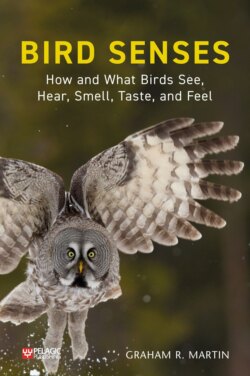Читать книгу Bird Senses - Graham R. Martin - Страница 11
На сайте Литреса книга снята с продажи.
Unlocking the information
ОглавлениеThe information that each bird species uses to guide its behaviours is a kind of secret. It is information that only the bird itself has direct access to. But for us to understand birds properly those secrets need to be unlocked in some way. The information that birds employ is not readily available to us as we look on. We need some tricks to help us get more than a hint of the information that a bird might be acting upon at any moment.
As humans, we are trapped in our own world, with its own secrets. Our eyes do not allow us to see what the Peregrine sees as it bears down upon a pigeon. We cannot feel what is at the Red Knot’s bill tip, we cannot smell the odours given off by leaves as they are devoured by caterpillars, and we cannot interpret the echoes of an Oilbird’s call as it bounces from the wall of a light-tight cave.
Even if we could look from the same perspective as the hunting Peregrine, we would not see and detect the world as it does. A view that is based upon the same vantage point as the bird’s cannot tell us what the Peregrine actually sees. Our eyes are not the eyes of a Peregrine, our ears are not those of an Oilbird, our fingertips are not able to detect what the Red Knot’s bill feels, and our tongues cannot taste what the Knot’s tongue tastes. Because of differences in the senses of different species, the information they provide of the same scene is different. In effect each species lives in a different secret world. Species may share the same environment, but the worlds that they inhabit are different.
Our inability to experience the different worlds of birds is not because our senses are relatively impoverished; it is not because birds have ‘super-senses’. There are certainly examples of bird species that can out-perform us in particular ways, but equally our senses often out-perform those of particular birds. The problem is that our own senses are specialised for the conduct of particular actions just as much as the senses of animals are specialised for the control of their particular actions.
Despite the popular view that humans are such an important species, it is clear that our eyes are not all-seeing, and our ears are not the detectors of every sound. All senses are selective of the information that they retrieve from the environment. One advantage that humans have over the birds, however, is that we can get valuable insights into their worlds. We can unlock some of their secrets through the application of science. In doing so we not only gain insights into the worlds of birds, but we also come to understand our own world from a fresh perspective.
